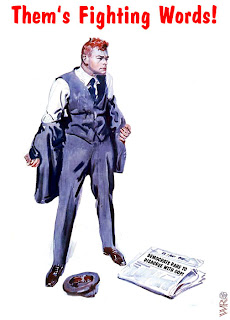Help Me Reach 12 on the Manly Scale of Absolute Gender
If you like the patriotic work we're doing, please consider donating a few dollars. We could use it. (if asked for my email, use "gen.jc.christian@gmail.com.")Thanks!
Sunday, November 30, 2008
If the Personal is Political, is the Political also Personal?
Posted by
Austin Cline
It was once said that the personal is political, drawing attention to the fact that issues commonly described as merely "personal" rely upon political ideologies and decisions. The reverse does not necessarily hold true: not all political decisions should be treated as personal. To be more specific, politicians should not take it personally when other politicians make political decisions that put them in difficult situations or make them uncomfortable. For some reason, though, more and more Republicans are doing just that — or at least they are pretending to do that.
I think that "pretending" is probably the more accurate description. A politician has to be a good actor (which explains why so many have found the transition from acting to politics relatively easy to make) and good politicians frequently have to make use of political theater in order to communicate particular messages. No one who manages to achieve any political office on the federal level could possibly suffer from having a thin skin, so you know they can't be very affected by criticism or even insults from just about anyone, never mind politicians from opposing political parties.
Despite this, a number of Republicans have actually tried to get the public to believe that they have such fragile egos that they are genuinely insulted by Democrats doing nothing remotely unusual or personal in politics — indeed, that they are so insulted that their work has been affected and they are unable or unwilling to work as well with Democrats. To call this petty and churlish would be an understatement. If every politician went to pout in the corner when someone from another party said or did something they didn't like, there wouldn't be enough corners to contain them all.
Who is behaving like this? Well, Sen. Susan Collins from Maine told colleagues at a prayer breakfast that she had "trouble forgiving colleagues" who helped her opponent campaign against her. Did she never help Republicans in their campaigns? Did she really expect Democrats to not want to help another Democrat get elected? Mitch McConnell of Kentucky said that his feelings were hurt because Democrats spent a lot of money to support his opponent. Did he ever object when Republicans spent a lot of money to help support a Republican candidate against a Democratic incumbent?
Like I said, the outrage of these Republicans — as well as all the Republicans who nod quietly without objecting — is more "faux" than "foe," but perhaps there is indeed some small sense in which these attitudes might be genuine. We've seen more and more over the past few years the degree to which politicians and others "inside the Beltway" consider themselves to all be part of the same clique, separate from outsiders. The strongest example may be how journalists will protect politicians from critique in order to keep them as friends and sources. Is it possible that some Republicans might expect Democratic colleagues to protect them from Democratic challengers?
It's hard to believe that might be true because it's just so incredibly absurd, but I'm not sure that it's really any less absurd than journalists protecting politicians from public critique rather than protecting the public from politicians' crimes. It's probably much more likely that Republicans are simply pretending and engaging in political theater, hoping that the public will never stop to think about how silly all their claims are. I also think we should keep in mind that whatever the most obvious motivation people may have for something, and however true it may be that this is indeed their motivation, we shouldn't forget that people tend to have multiple influences on their lives and behaviors. It would be a mistake to reduce a person's motives to just a single dimension or single desire.
Subscribe to:
Post Comments (Atom)


No comments:
Post a Comment
We'll try dumping haloscan and see how it works.